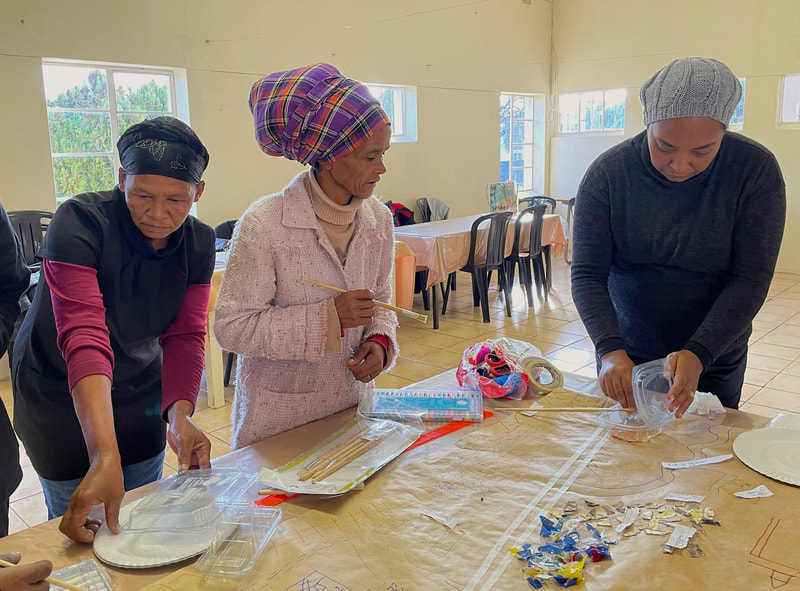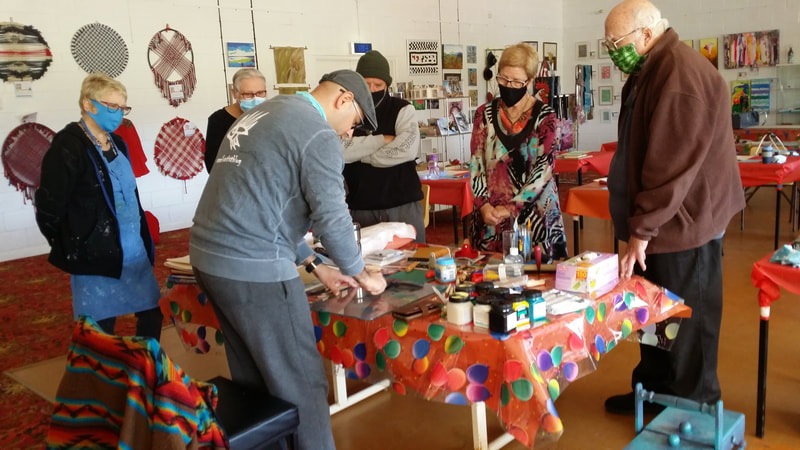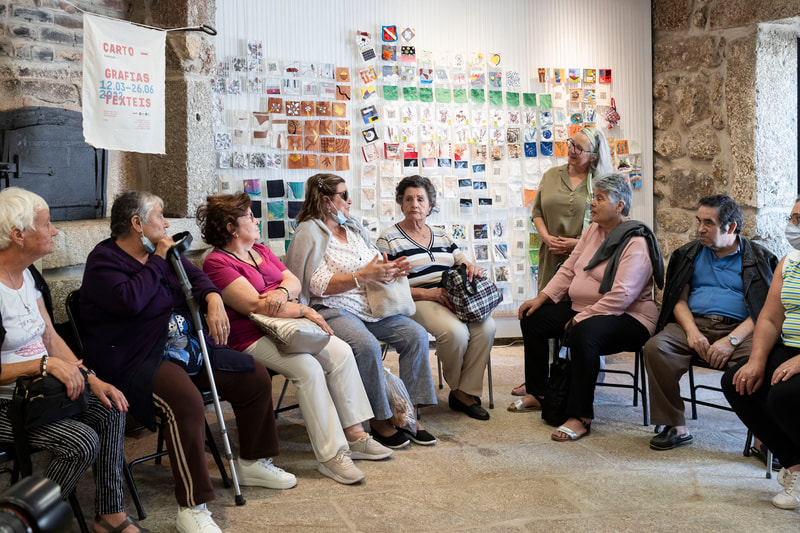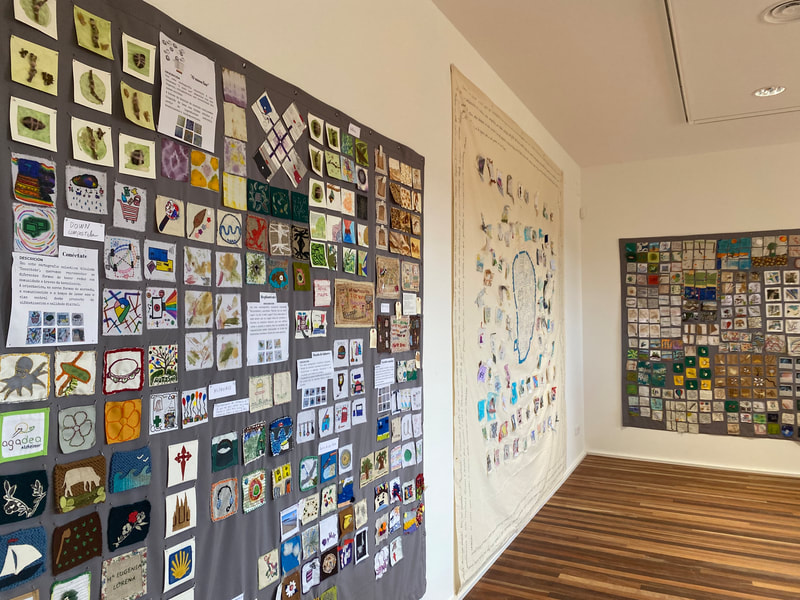Project Overview
Textile Cartographies is a participatory action research project using textile arts as story telling, coordinated by APECV Research Group on Arts, Community and Education (GriArCE) with 27 groups from universities, schools, collectives and NGOs in Americas; Africa; Asia; Australia and Europe. The project aims to give voice to minority and peripheral groups in relation to issues such as environment; climate justice; social justice and other sustainability issues through exploring visual discourses using arts and textile technologies.
Coordination |
International Coordination:
Research Group of the Association of Teachers of Expression and Visual Communication (APECV) and C3 Group. Groups: Portugal: 3; Spain: 7; Cyprus: 1; USA: 2; Brazil: 2; Mexico:1; Egypt: 1; Saudi Arabia:1; South Africa: 1; Namibia:2; Canada 1; Japan :1; Italy: 1; Iran: 1; China_ 1; Japan: 2; India:1. Individual Participants; USA: 1; Germany:1; and Norway: 1. See Here the Groups The creators of textile maps observe the places, inquire about their history, search for signs, meanings, alternatives. And they represent the stories using fabrics, threads, ropes, wool, etc. with sewing or weaving techniques. To realize climate justice, men and women’s voices must be heard. Textile cartography is a way to tell stories, express ideas; draw attention; talk about eARTh, Maps reinvented with fabrics and threads.
timetable2021: generation of ideas, establishing a network
2022: establishing a network, pedagogical kit; 7 exhibitions, one walking seminar in Portugal. 2023: enlarging the network, 8 exhibitions; one walking seminar in Mexico: one Publication, 4 presentations in congresses. 2024: enlarging the network, 8 exhibitions; one walking seminar in Cyprus, one Publication, 4 presentations in congresses.
Project partners include NGOs, universities and Museums such as Association of Teachers of Expression and Visual Communication (APECV), C3 group, Spain; Bridge to Nowhere Arts Association Incorporated, South Australia; University of Guadalajara, México; University of Valencia, Spain; University of Brasilia, Brazil; University Federal of S. Paulo; University of Helwan, Egypt; NGO HEXLappies, South Africa; University of Minnesota Duluth (UMD), Missouri State University in Springfield, USA; Teaching and Learning, College of Education. USA; Namibian Society for Arts Education, Walvis Bay, Namibia. University of Almeria, Spain; University of Jaén, Spain, University of Santiago de Compostela, Spain; University of Nicosia, Cyprus and University of British Columbia, Canada. |
Process |
The project idea was developed with invitations to researchers and online meetings to define lines of research and action. It was decided to use participatory action research methods. The implementation of the project started in January 2021 and is coordinated by the international and local coordinators who invite participants to join the project. Following participatory and arts based dimensions, the coordinators and participants explore collaborative process through textile arts as means of communication and activist expression to express ideas and feelings about environmental issues. During the first 2 years of the project, ecofeminist and localization lines of action emerged in all the groups. We are now In the third year of the project. |
Activities |
During The process is planned locally and through international online meeting with coordinators and participants. Ethical guidelines and Plans for Actions are designed collaboratively.
During 2021 the coordinators shared their visions about cartography and examples of activist textile artists . KIT In 2022 the researchers from Santiago de Compostela Maria Jesus Agra and Cristina Trigo selected artists of reference for the project and created a pedagogical kit as a resource for the group Actions : Local Actions During 2021- 2024 each of the local coordinators promoted actions with groups of people interested in creating a narrative that expresses ideas and opinions about human action on planet Earth in individual textile squares 10x10 cm . GIFTS- Exhibitions During 2022-2024 each Group sent textile works as gifts to other groups for the setting of collective exhibitions, see here the list of international exhibitions. Read More about the Project . fieldwork notes, 2023-2024PARTICIPATORY installation; SURPRISE; NARRATIVES; PLACES ( Bridge to Nowhere); Transforming Museum Audiences; Transforming Museum Practices; Different groups; Collaboration University- Museum- Communities- Schools ACTIVATING the PARTICIPATION (Santiago) Ladies; Schools: Children were stitching everywhere in the school ( Namibia) Certification of exhibitions; MUSEUMS, Places for exhibition (Elisabeth, Germany) NARRATIVES. Emotional, Elders, Community ( Carla, Portugal)NARRATIVES. Peace; Transformation; intergenerational groups in university; Places ( Patricia, Mexico). Sound, university ; future teachers ( Ramona, Spain) NARRATIVES, MOTHERHOOD Feminism Women’s Voices; university, schools, community ( Maria-Paz. Spain) NARRATIVES; Women’s Stories SHOWING Women’s voices ; posting is expensive; travelling is not possible, see in the map the places where the works are exhibited ( HEXLAPPIES) How to make it simple for Children? ( Petra) . Manhatan Project; NARRATIVES, University students ( Yichien, WDC) Don’t FEEL ALONE – CONNECTIONS- Be Part of a MAP of VOICES – Transforming Practices. Love & Connections ( Lisa Fitzpatrick, Duluth). Joy of Making ( ABESA, Portugal) DIVERSITY (Paty, Mexico)| PEACE|MAKING| LEARNING about PLACES|Drifts|GIFT|BELONGING|Creating Communities| Understanding places| Immersion in Context (Group conversations, Mexico, 2nd November 2023)
|
|
# Environmental education #climat justice #earthcharter #artivism #activism #citizen participation # art and design #textile arts #handicrafts #social engaged arts #ecofeminism #education #citizenship #textilemaps # participatory arts #arts based research # participatory design # sustainability#community arts #participatory action research #localization #cartographies
|





